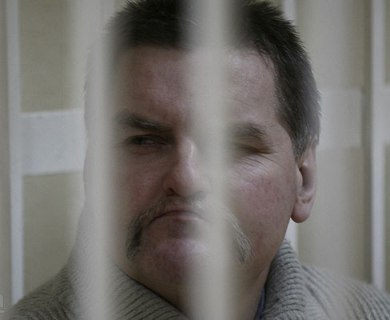Brief analytical review of court sitting on criminal case of Dzmitry Miadzvedz
On 1 March 2011
the court hearings on the criminal case of Dzmitry Leanidavich Miadzvedz,
charged with violation of Article 293, part 2 of the Criminal Code of the
Republic of Belarus, 'mass riot', started at the Maskouski District Court with
the participation of Judge Alena Rudnitskaya, Deputy Prosecutor of the
Maskouski district K.Mazouka (who represented the state accusation),
Miadzvedz's attorney Siarhei Lepesh and a representative of the state
plaintiff, the Main Council of the Presidential Administration.
The trial opened with a speech of the state accuser, who refused from the
earlier charges and solicited for presenting new charges to Mr. Miadzvedz,
which he read aloud. In fact, the new accusation is an improved variant of the
old one.
In particular, according to the state accuser, Mr. Miadzvedz took an active
part in the mass riot, justifying his actions by a far-fetched reason –
manipulation of the election results. Together with other persons, he yielded
to the uncontrollable wild crowd which acted as a single group, and showed
armed resistance to the police, as a result of which a number of police
officers received light bodily injuries and physical traumas of different
grades of severity.
The formal accusation also alleges that other participants of the mass riot
carried tools for violent actions: iron bars, spades, wooden beams and bottles
with incendiary mix. These unidentified persons allegedly inflicted traumas to
the police, while Dzmitry Miadzvedz delivered several blows on the police
officers with his fists and feet.
The accusation also listed the names of at least 10 police officers who had
been confessed victims by forensic expertise. If the court declares them
victims in the case as well, they will get an opportunity to lodge civil claims
for compensation of the harm that was allegedly inflicted to them by Dzmitry
Miadzvedz. The expert conclusions were attached to the case materials.
The civil claim, lodged by the Main Economic Council of the Presidential Administration
and demanding 14 million rubles in damages, figures in the case as well, though
it has been completely compensated by citizens and human rights defenders, and
the representative of the plaintiff refused from it at the court sitting on
Breus' and Gaponov case. That's why one can expect that at this trial the
plaintiff to refuse from pretensions on this claim as well.
After the new accusation was read, attorney Siarhei Lepesh moved for being
given time for familiarization with the new charges. The motion was granted by
the court and the trial was postponed to 10 March 2011.
Preliminary conclusions
The analysis of actions of the accusation at the trials of Vasil Parfiankou, Ivan Gaponov and Artyom Breus shows that the investigation had no reasons to charge participants of the peaceful protest action of 19 December with mass rioting. Neither the preliminary investigation nor the court managed to prove the presence of the corpus delicti of mass riot in actions of Parfiankou, Breus and Gaponov. There was no armed resistance, arsons, assaults on the police or personal violence from their side. That's why, understanding the necessity to strengthen the position of the accusation at the trial of Dzmitry Miadzvedz, the state accuser read new charges, in which emphasis is made on the alleged presence of unidentified persons who held items that were used as weapons, used personal violence and resisted to the police. At the same time, police victims were introduced in the case. However, the state accusation doesn't answer the most important question: which relation did Dzmitry Miadzvedz have to these events? As it follows from the text of the representative of the procuracy, bodily injuries (if there were really any) were inflicted and the windows at the entrance doors of the House of the Government were smashed by unidentified persons, not by the defendant. The appearance of the results of the forensic expertise in the case materials in 2.5 months after the events, also looks surprising.
That's why, in case no further evidence of Miadzvedz's guilt is presented, the court, judging just his own actions, must completely justify Mr. Miadzvedz instead of making him responsible for actions of 'unidentified persons', by which the procuracy tries to cover the evident absence of mass riot on 19 December 2010 in Minsk.


















